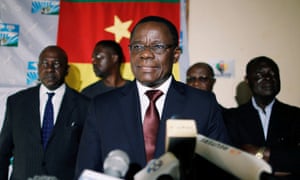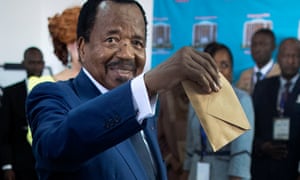Cameroon arrests opposition leader who claims he won 2018 election
Maurice Kamto and several others held following protests against result of October poll
The Cameroonian opposition leader who claims he won last year’s election has been arrested.
Police arrested Maurice Kamto on Monday along with several other opposition figures, including one who was pulled out of his hospital bed where he was recovering from gunshot wounds sustained at a protest against the central African country’s longtime president, Paul Biya.
Kamto was arrested at a supporter’s house in the economic capital, Douala, and according to local media transferred to the judicial police station in the political capital, Yaoundé, though the prominent lawyer and activist Felix Agbor Nkongho said he had been taken to an unknown destination.
After Kamto was taken away hundreds of people surrounded the house. Police officers fired shots in the air to disperse them.
Kamto and his party, the Cameroon Renaissance Movement, claim that they won the election in October, but the official figures showed them winning only 14% of the vote, in second place to the 85-year-old Biya, who has been in power for 36 years.
Since then the opposition has organised several protests, the latest of which took place on Saturday in towns across the country, and during which 117 people were arrested. Police opened fire on protesters with live ammunition.
The country has been descending into crisis as separatists in the English-speaking part battle with security forces to split off from the Francophone part, with civilians caught in the crossfire. The UN says more than 430,000 people have been displaced and hundreds killed. The military has been accused of killing civilians and looting, while separatists are apparently behind a rising number of kidnappings for ransom. Civilians are frequently deserting their homes and hiding in the countryside.
The situation in the town of Kumbo, in the north-west region, has deteriorated rapidly since Christmas, with residents of the area reporting that every time they try to go to town the military appears from the barracks nearby and opens fire. Often, they injure or indiscriminately kill civilians, residents say.
“We got up today with serious gunshots as from 4am,” one said last week. “The military have surrounded the park at Mbveh and [have been] shooting up seriously to the extent that they have killed one pregnant woman and wounded one separatist fighter.”
A few days later, another resident said two more fighters and a woman and her child were killed. “Yesterday was terrible in Kumbo again,” the person, who did not want to be named, said. “The military left for Mbveh shooting randomly in the air … people ran abandoning their shops and the military got into some and carried [away] huge sums of money. This morning everybody is scared, but they have not come back again.”
The whole city has been relying on a few springs for drinking water, as the water supply has been cut off due to the crisis. Residents say the water situation is becoming desperate.
The crisis started in 2016 as a demand for English to be used in courts and classrooms in the Anglophone regions.
As 2019 begins…
… we’re asking readers to make a new year contribution in support of The Guardian’s independent journalism. More people are reading and supporting our independent, investigative reporting than ever before. And unlike many news organisations, we have chosen an approach that allows us to keep our journalism open and accessible to all, regardless of where they live or what they can afford. But this is only possible thanks to voluntary support from our readers – something we have to maintain and build on for every year to come.
The Guardian is editorially independent, meaning we set our own agenda. Our journalism is free from commercial bias and not influenced by billionaire owners, politicians or shareholders. No one edits our editor. No one steers our opinion. This is important as it enables us to give a voice to those less heard, challenge the powerful and hold them to account. It’s what makes us different to so many others in the media, at a time when factual, honest reporting is critical.
Please make a new year contribution today to help us deliver the independent journalism the world needs for 2019 and beyond. Support The Guardian from as little as $1 – and it only takes a minute. Thank you.


No comments:
Post a Comment